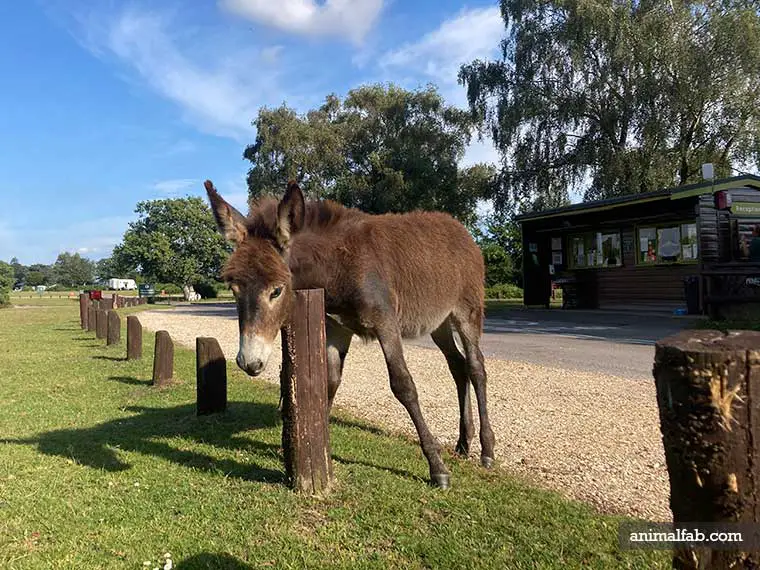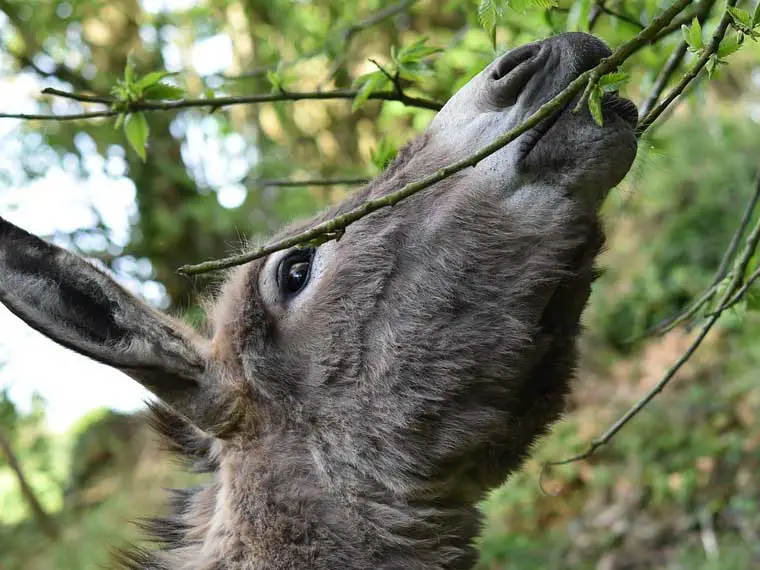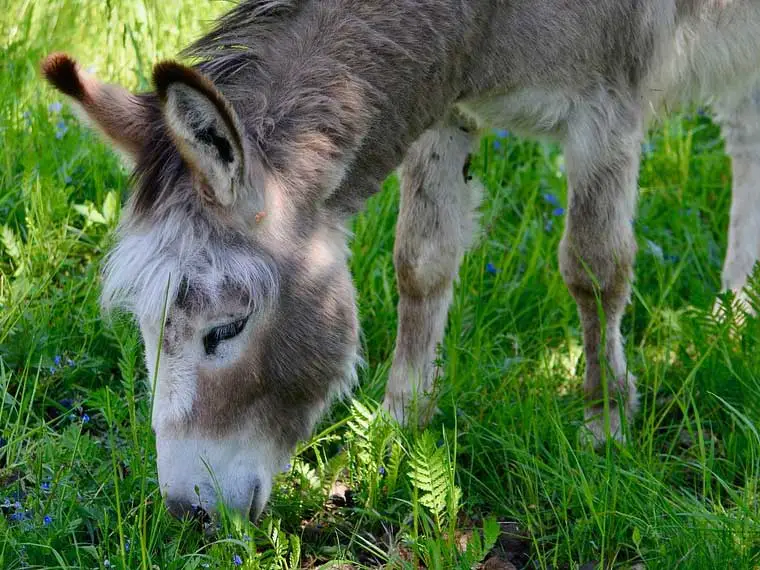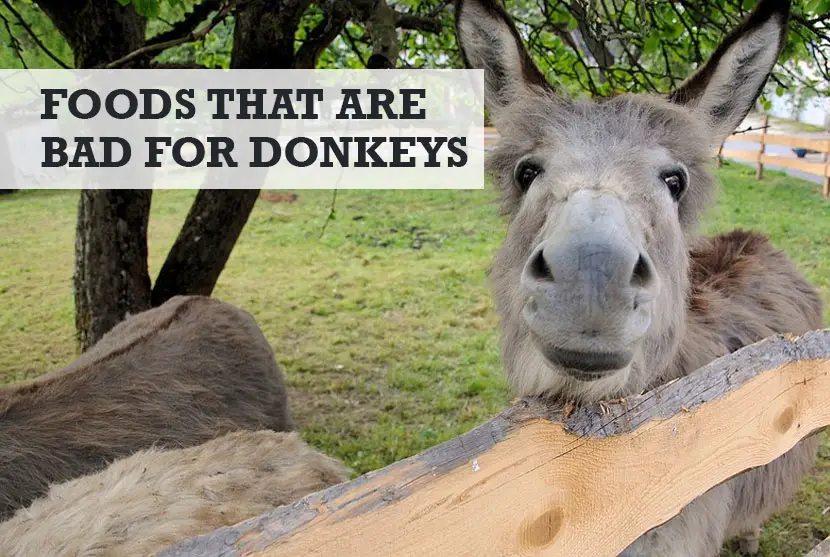If you’re thinking about owning a donkey, or perhaps there are wild donkeys near you, it’s imperative you know what they can and can’t eat. Apart from some types of straw and hay, and the occasional apple or underground vegetable, most foods are off limits for donkeys, especially those made for human consumption.
I despair when I see people putting their hands out to wild donkeys with food. It’s so easy to get it wrong, which is why I’ve put this list together which explain what food is bad for donkeys, including some which are even poisonous foods for donkeys.
Here’s what donkeys should not eat… please print it out and keep.
What food is bad for donkeys
The list of foods that donkeys should not eat, is long. There are so many foods that can be bad and poisonous to donkeys that it’s a lot simpler to explain what food groups and types are bad for them… then of course, lower down the page, what donkeys should be eating.
Chief among these making sure the donkeys diet is low in proteins, specifically animal proteins, grains. Then you should completely avoid sugars and foods from the nightshade, cruciferous and allium families.
Here’s why some foods are bad for donkeys in high amounts, plus some very poisonous ones.
1. Keep proteins low
Donkeys need around a half to a third of the daily protein requirements of a horse. Their bodies are capable of recycling the nitrogen derived from proteins in the body, whereas horses, and other mammals, excrete excess quantities in their urine.
An excess of proteins could become toxic and will be bad for a donkey.

2. Avoid dairy products and animal protein
Also note that donkeys are vegetarians, so except for their mother’s milk, donkeys should not be given animal protein – it can be fatal to them. This includes dairy products. They do not have the internal mechanisms to digest it very well.
3. Be careful with grains and legumes
Grains are too high in carbohydrates, and legumes are too high in protein for the donkey diet. Instead is better for a donkey’s health to eat the straw resulting from the harvest of grains than for them to eat the grain itself.
4. The nightshade family of vegetables (toxic / poisonous)
Potatoes, tomatoes, bell peppers and eggplant are all members of the nightshade family and are related to belladonna, otherwise known as ‘deadly nightshade’, because of its toxicity.
These plants contain a poison called solanine, which is concentrated in the leaves and stems. It is also found in green potatoes, which are the roots of the plant.
Whilst a little might not harm the donkey, if eaten to excess, these foods are very bad for donkeys, poisoning their system.
5. Cruciferous family, specifically brassicas (toxic / poisonous)
Although turnips belong to the cruciferous family, they are actually safe for donkeys to eat. However, broccoli, cauliflower, brussels sprouts, cabbage and kale are not, and are bad foods for donkeys.
If eaten in their raw form, they are potentially toxic, even to humans, who have thyroid problems or an iodine deficiency.
6. Allium family of foods (toxic / poisonous)
Onions, leeks, garlic and chives are all members of the allium or onion family. They are toxic to most domestic animals as they cause damage to red blood cells, which results in anaemia.
Similarly, whilst a little onion might not harm the donkey, if eaten to excess, these foods are very bad for donkeys, poisoning their system.
Please Note: This list of toxic and poisonous foods for donkeys is not exhaustive. Please consult with a veterinarian for a full list.
The reason that these foods are bad for donkeys is down to their genetic make-up. Donkeys have an extremely slow but efficient digestive system. It can squeeze the goodness out of the most marginal vegetation on the planet.
Therefore, their metabolisms are not designed for processing rich food, hence there are few food groups that are suitable for donkeys.
Donkeys are vegetarian, and their diet needs to be high in fibre, and low in carbohydrates and proteins. Animal proteins, such as dairy, can be fatal. You would be ill advised to give your donkey vegetables in the onion, potato or broccoli families.
Grains and any processed food, such as bread, cake and candy are strictly forbidden. Their bodies do not have the capacity to generate the insulin necessary to deal with sugar and other starches. Given that donkeys require such low levels of nutrition, they have fairly delicate, and finely tuned metabolisms.
Donkeys should eat like birds, little but often, in order to give their food time to digest. If overfed they are predisposed towards obesity, insulin resistance and liver disease, much like humans.
Donkeys are also prone to develop laminitis which is an inflammation between the hoof and the connecting bone tissue, caused chiefly by obesity.
Handy Hint: Donkeys can run faster than you might think. Read this article where I research a donkey’s stop speed.
Factors determining what a donkey should eat
The best diet for a donkey depends on its age, the state of its health and its lifestyle. There are also seasonal adjustments you can make to your donkey’s diet.
Because of the fibrous nature of its natural diet, a great deal of importance needs to be placed on your donkey’s dental hygiene. Donkeys need healthy teeth and gums in order to chew their food properly. The digestion of their food starts in the mouth, aided by the production of saliva.

Young, growing donkeys, once they have been weaned from their mothers, will have strong teeth and are capable of chewing tougher food. Older donkeys need to be given food that is easier to chew.
Working donkeys can absorb a higher caloric intake of food than those are standing around, looking cute at a petting zoo or donkey sanctuary.
The best food for donkeys
So, now those warnings are over, it’s worth considering what foods are good for a donkey. If you stick to these foods, you reduce any risk of giving a donkey poisonous or unsuitable foods.
What do donkeys eat in the wild?
In the wild, donkeys browse on shrubs and even eat the bark off trees. The foods closest to their natural diet are straw and hay. However, not all hay is beneficial, and grasses cut for other purposes are potentially harmful.
Be sure to buy your straw and hay from a reputable dealer that has not mixed in harmful or poisonous plants, such as linseed or ragwort.
1. Straw
Straw is usually described as a by-product of grain production. Some might call it a waste product. Once the grain has been harvested, the stems are gathered and baled. Straw has very low nutritional value and is generally not considered suitable as animal feed.
However, some types of straw are ideal for donkeys. Barley straw is the best type of straw for a healthy donkey. It is low enough in nutritional value to sustain the animal and will not cause it to pick up too much weight.
Oat straw is also a good option. It has a higher nutritional value than barley straw and could be used for sick, elderly, working or lactating donkeys.
Wheat straw has the required low nutritional value but is better for animals with strong teeth.
2. Hay
Hay is made from grasses and legumes that have not yet seeded. It is high in nutritional value and is grown specifically as an animal feed. It is dried and stored in bales for times of drought and winter seasons, when there is less fresh grazing available.
There are often two cuttings of hay in the agricultural year. The first spring cutting is higher in nutritional value than the later summer cutting. The second cutting is better for the donkey diet.
Forbidden hay – legumes, silage and grass cuttings
Donkeys should only eat hay that has been made from grasses, not legumes. The latter has too high a protein content. Donkeys are not designed to eat food from lush pastures.
Donkeys should not eat grass that has been harvested for silage.
Silage is cut, baled and wrapped in plastic immediately. This preserves the moisture content at between 40-60%, whereas hay has a moisture content of less that 12%. Silage has a high nutritional value and, you guessed it, is unsuitable for donkeys.
Grass cuttings from your lawn can give your donkey colic. Once again, the nutritional value and moisture content are too high for its dietary requirements.
3. Grazing and foraging
Foraging and grazing are good for donkeys, as these activities encouragement movement. However, they should not be allowed to graze for too long on lush, new grass for the same reasons as stated above.
A healthier option, for donkeys, is to give them access to meadow fields that have gone to seed and have less nutritional value, or to allow them into grass fields during the winter months.

Can donkeys just eat grass?
No, a donkey cannot just eat grass. It needs a more balanced diet. According to the UK’s Donkey Sanctuary website:
In their natural habitat donkeys will browse, eating highly fibrous plant material in small quantities throughout the day. In addition to the restricted grazing our donkeys always have access to barley straw to ensure they are getting plenty of fibre to meet their nutritional needs. The amount of grass donkeys have access to is controlled, either by strip grazing using electric fencing or by co-grazing with other species to prevent them from becoming overweight.
4. Some treats (but not sugar ones)
Donkeys are intelligent animals and are capable of training human beings to satisfy culinary desires that are detrimental to their health, such as cake and candy. It is not long before they adopt an air of entitlement, and start throwing their weight around.
You need to remain firm for the sake of the donkey’s long term wellbeing. Treats should be limited to winter when the cold weather might warrant the consumption of a few extra calories.
As an indulgence, donkeys can be fed vegetables such as carrots, turnips, swedes and squash. These need to be limited to one a day, in winter, for working animals. Sedentary animals can be given a few pieces a day, or an entire vegetable once or twice a week.
They enjoy fruits such as apples and watermelon, but these are not part of their natural diet and need to be given in moderation. They will eat bananas, skins and all. Left to their own devices, donkeys will forage for berries.
If there are a number of people taking care of the donkeys, care needs to be taken that these treats are strictly controlled.
Cut the treats into strips or wedges to prevent choking, and wash any shop-bought fruit to remove traces of pesticides. Do not give donkeys whole stone fruits as they may choke on the pips.
Signs your donkey is sick from food
If your donkey has eaten food that has poisoned them, here are some signs to watch out for.
- constant braying (sometimes at night).
- loss of appetite.
- weight loss.
- lethargy and weakness.
- incoordination.
- anemia.
- unusual manure consistency or diarrhea.
- respiratory distress or blindness.
Conclusion
These docile animals originated from the arid desert regions of North Africa. They were found to be easy to domesticate, and cheap to feed, and consequently became useful pack animals in the region. Their popularity soon spread to the coastal climes of the Mediterranean.
Chances are you will see a donkey at some point during the next 12 months, but if you do, please resist the temptation to feed them. You never know if what you are giving them to eat could make them ill.
You might also like…
- The signs that a donkey is ready to give birth
- How your donkey shows he or she loves you
- The truth about horses and donkeys mating
Image in header via https://pixabay.com/photos/donkey-nature-animal-rural-meadow-2728033/

